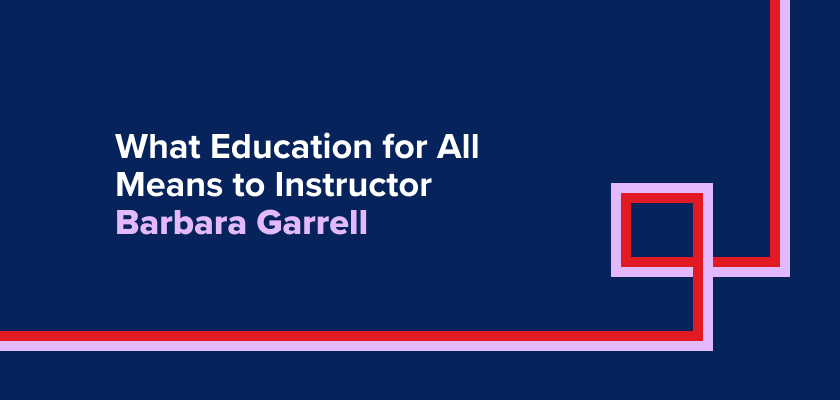Education for All: Instructor Barbara Garrell Shares What It Means to Her
I will advocate adding IA to more of our courses for the simple reason that it has made a positive impact on student retention and success.

In her thoughtful assessment of the meaning of Education for All, Instructor Garrell points to the importance of Inclusive Access (IA) programs, explaining that “I will advocate adding IA to more of our courses for the simple reason that it has made a positive impact on student retention and success.”
Inclusive Access is a course material and affordability program, designed by institutions and guided by the Department of Education to deliver digital learning resources to students, at a significantly reduced cost, on or before the first day of class.
Instructor Garrell’s observation of the impact of IA on student retention and success is supported by a variety of sources on the subject. For example, Inclusive Access has saved college students using McGraw Hill products an estimated $500 Million dollars since 2018.
To cite a study from our white paper, Education for All: What It Takes to Get There, universities and colleges using Inclusive Access were able to reduce the barrier to course materials and improve student grades. Maysville Community and Technical College in Kentucky applied IA to its course materials and the number of students who earned As, Bs, and Cs rose 21%*.
*McGraw Hill, “Maysville Community and Technical College Case Study”, n.d.
Here's what Barbara had to say:
I teach at a Community College; therefore, my perspective might be a bit different from that of someone who teaches at a four-year University.
I believe everyone has a right to a quality education with equitable access to learning. We need education without barriers and without discrimination. Education is not a one-size-fits-all enterprise and shouldn't be treated as such.
One of the biggest barriers I see again and again is that students cannot afford to purchase the required course materials. Here is an example of a problem my colleagues and I encounter every semester with courses that require digital access.
Problem: Cost of course materials.
At the beginning of the semester, students hit the ground running, taking advantage of the 14-day free courtesy access that is usually available with digital course materials. Once Day 15 is upon them, it’s game over for many. Students email instructors the dreaded email stating they cannot purchase the code. As additional days pass, the situation worsens for students as they fall further behind, and unfortunately many never recover.
Solution: Inclusive Access.
After 4 years of pushing for IA, I received approval for one of my gateway courses. It’s been a game-changer, by eliminating the dreaded conversation on Day 15.
So, if you ask if Inclusive Access appeals to me, the answer is a hands-down Yes! I will advocate adding IA to more of our courses for the simple reason that it has made a positive impact on student retention and success. In fact, my Canvas administrator just thanked me for pushing for IA and stated that “I cannot purchase the code” emails from students in my course have been nonexistent since we implemented the IA program last Fall.
As for additional barriers, students have diverse learning needs and as an educator, it's important for me to provide inclusive instruction. Most of my classes are taught in an online, asynchronous environment, so I am no longer the primary source of knowledge. Using digital platforms, such as McGraw Hill Connect® and SIMnet®, allows me to assign various activities including, but not limited to, simulations, discussions, practice exercises, and assessments that I could not provide on my own.
In addition, students get immediate feedback, which is an integral part of the learning process. Above all, these platforms can be used successfully for all types of learning environments, including traditional, online, HyFlex, and hybrid. So yes, there are still barriers to education for all, but these are just some of the ways to minimize and even overcome those barriers without sacrificing quality for equity.
For more on how to foster student success, download our new white paper, Education for All: What It Takes to Get There.


